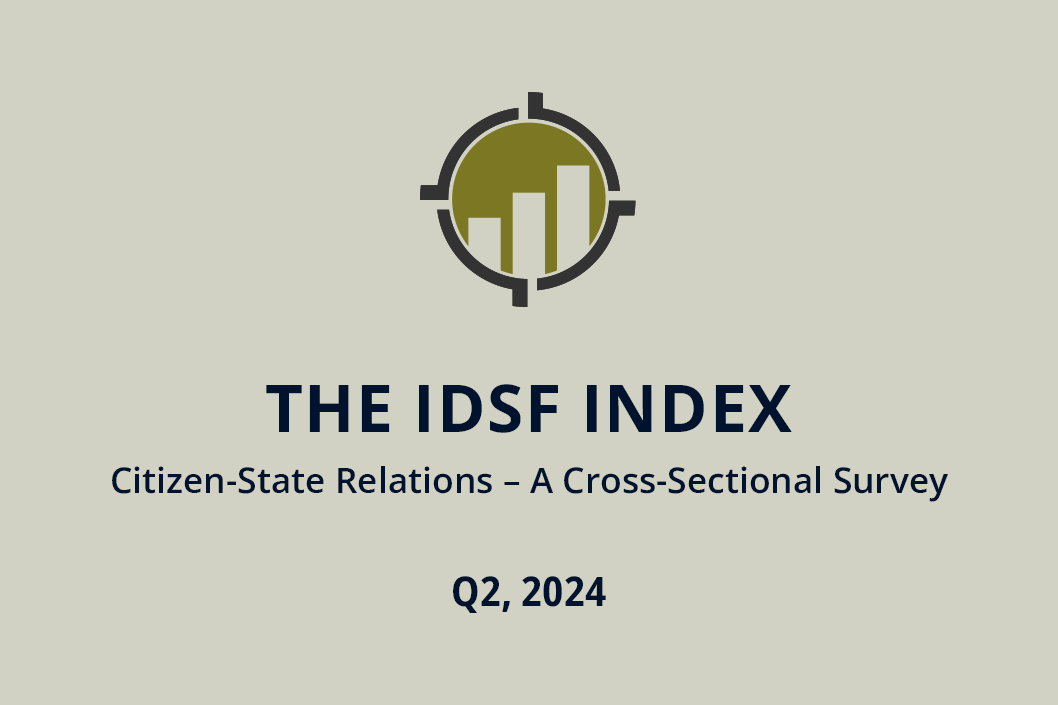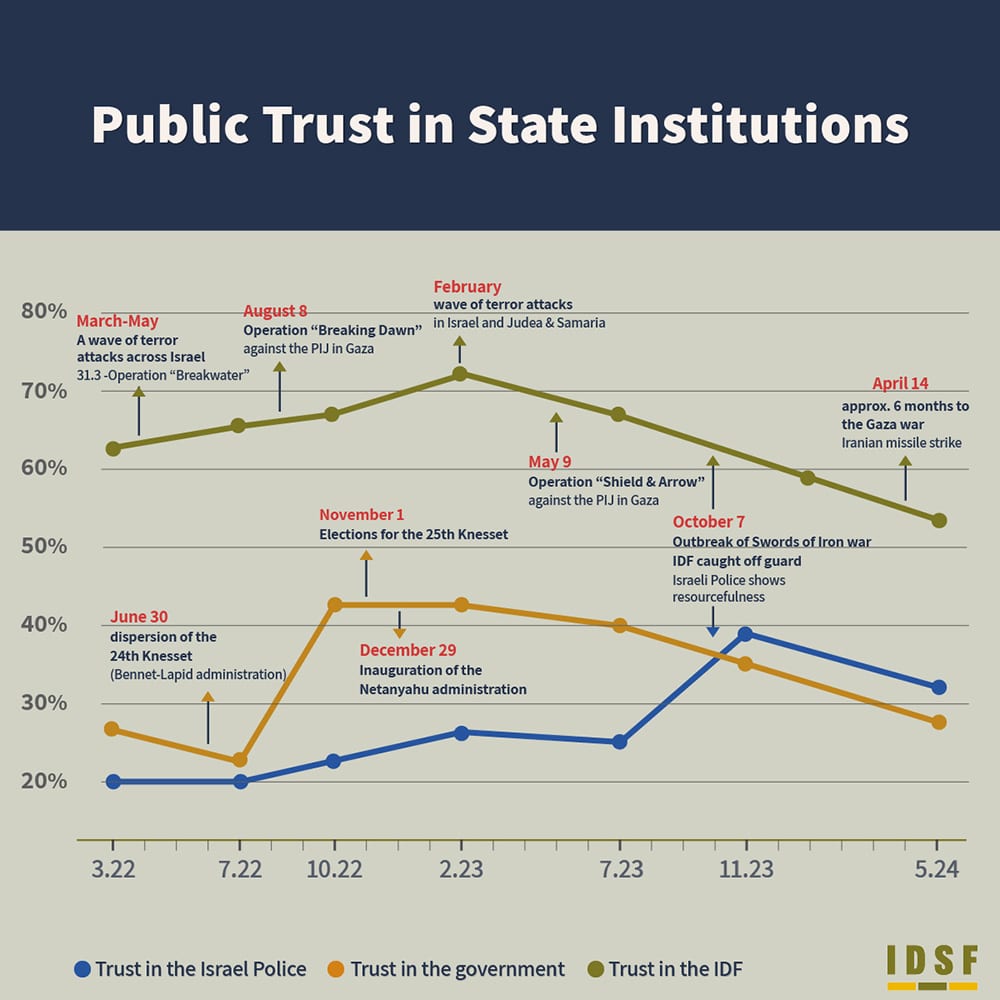
Among the many endeavors and projects undertaken by the IDSF HaBithonistim movement, it prides itself on a prolific research department and its professional academic research team, which conducts ongoing research and surveys of Israel’s society, among them the IDSF HaBithonistim Index. The survey is published every quarter and is monitored to ensure it includes a representative sample of respondents from all walks of Israeli society. The index reports the findings on public opinion on various national security and social issues in Israel. Thus far, seven indices have been published, each exploring a specific topic but also including repeat questions aiming to gauge changes in public opinion over time against the background of current affairs.
Among the topics explored, the surveys sought to determine the extent to which Israeli public has faith in the country’s authorities, its sense of personal safety and concerns over the future of the State.
The present survey report provides a longitudinal review of these topics and explores the changes over the past two years.
Support of the police on the rise, of the IDF in decline – the public’s trust in State institutions
All the IDSF HaBithonistim surveys included questions aiming to gauge the participants’ trust in the IDF, Israel Police and the government. The rationale behind these reoccurring questions is that a vital element of the national security is the social resilience of the nation, of which one derivative is the level of trust the public has for the State authorities.
In the first survey, held on March 2022, 20% of the respondents said they had faith in the police; 28% trusted the government and 63% said they had faith in the IDF.
However, in the last survey, held in May 2024, 33% of the respondents said they trusted the police; 27% said they had faith in the government and 54% expressed their trust in the IDF.
A comparison between these two end surveys shows a-13% rise in the public’s trust in the police; a 9% decline in its trust of the IDF and a nearly unchanged level of trust in the government. However, a longitudinal examination of the findings over time reveals fluctuations in how the public responded to current events in Israel. The present report follows the trend over time in the public’s trust towards the three bodies – the IDF, Israel Police and the Israeli government.
The IDF
The IDF is the only of the three bodies that consistently gains the highest levels of trust on part of the Israeli public, leaving the other two bodies well behind. However, of the three institutions surveyed, the IDF also recorded the steepest drop in the level of public trust. The watershed moment is obvious: October 7. Up to the July 2023 survey, the level of public trust in the IDF was 63%-72%; however, on November 2023 – the first of the surveys following the October 7 events – that trust dropped to 59% and in May 2024 had further dropped to 54% – almost a 20% drop from its peak level.
Even before October 7, there were fluctuations in the levels of public trust in the IDF. Thus for example, in the wake of Operation Breaking Dawn in August 2022, the level of public trust in the IDF was on the rise. Operation Breaking Dawn was a concerted three-day operation in the Gaza Strip during which the security forces located and eliminated 25 known terrorists, many of them senior ranking – in the Islamic Jihad and Hamas with blood on their hands. The IDF had also succeeded in shooting down 96% of the rockets launched at Israel from the Gaza Strip during the operation. No casualties were suffered on the Israeli side hence the operation was chalked up as a great success, which would explain the rise in the public’s trust in the IDF.
However, as oppose to that operation, the following Operation Shield and Arrow on February 2023 actually caused a slight dip in the levels of public trust in the IDF. Although deemed a considerable military success, with six high-ranking Jihad members and another 20 terrorists eliminated in addition to hundreds of military targets destroyed by the IDF, the civilian population suffered more casualties as compared with Operation Breaking Dawn – during the week leading up to Operation Sheild and Arrow, 102 rockets were fired at the Gaza border envelope communities and adjacent towns, causing the death of one foreign worker and the injury of six Israeli citizens. During the operation itself, hundreds more rockets, anti-tank grenades and mortar shells were fired at Israel, reaching as far as the center of the country. Most were intercepted by Israeli defense systems, but an 82-year-old woman was killed when her house in Rehovot took a direct hit. Moreover, during the operation, all schools were suspended in the Gaza envelop communities, public gatherings and events were prohibited and main roads were blocked in southern Israel. It is possible that the fact that the IDF responded only a week into the Islamic Jihad’s rocket attacks and the price that the civilian front paid may be the reason for the drop in public trust of the army.
The Police
The public’s trust in the Israel Police is consistently the lowest of all three institutions throughout the surveys. However, it is the police that has recorded the largest increase in trust levels throughout the seven surveys of the index. Similarly to the IDF, the turning point was the October 7 events – only in this case, the trend was reversed. Up to the July 2023 survey, the public’s trust level in the police was at a relatively low 20%-23%, on November 2023, it leapt to 39%. On May 2024, the level of public trust in the police slightly dipped and is now at 33%. It appears that the performance of the police, from the onset of the “Parash Pleshet” alert code announced on the morning of the October 7 attack, and the steep price in the form of dozens of casualties from the police forces, had greatly contributed to the public’s trust in the body – at least temporarily. It will be interesting to examine the findings of the next survey.
The Government
An examination of the first of the seven surveys against the recent poll shows that trust levels in the government are nearly unchanged between those two points in time. However, following the trend throughout the seven surveys of the Index reveals significant fluctuations. At its peak, public-trust levels of the government reached 43%, but at its lowest plummeted to only 22%. It is likely that the fluctuations stem from the political instability that characterized Israel’s politics over the past several years and the consequent series of frequent elections. Thus for example, there is a correlation between the decision to dissolve the 24th Knesset on June 6, 2022 and the ensuing early elections, with July’s drop in the public’s trust of the government. On the other hand, on October, Israel was on the verge of elections, and it is possible that Israeli society felt that political stability is at hand. Even in the survey held on February 2023, after those elections, the level of trust in the government held at 43% – despite the social protests against the judicial reform.
Political shifts and social protests aside, the events of October 7 had an effect on the public’s trust of the government, albeit less markedly than the IDF and the police. After the October 7 massacre, the public’s trust in the government dropped from 40% to 35%, later further dropping to 27%. It should be noted that the decrease in trust of the government and increase in the public’s trust of the police following the outbreak of the Gaza war turned the tables and it was now the government that had become the least trusted body of the three.
“The changing tide after October 7 is hardly surprising”, says Brigadier General (res.) Amir Avivi, Chairman of the IDSF HaBithonistim movement. “This horrible day is a terrible failure of the IDF in terms of intel and an operational failure as well, and it is not surprising that the public’s trust in the army was hurt. I would actually expect it to drop even more. On the other hand, the police displayed outstanding resourcefulness that day and took command of sectors that are under military responsibility. The police officers – many paying with their lives – were able to stop the terrorists from advancing to Ashkelon and other areas deeper within Israel, so it is clear why the public hold the police in high regard”.
According to Avivi, the fact that the public’s trust in the government has not changed significantly following October 7 is also a built-in insight. “The public mostly believed that the government was not made aware of the intel and was not privy to the decisions that led to the disaster”, he explained. “We can see by the other questions in the IDSF HaBithonistim Index’s survey that the IDF command is held more responsible [for October 7] than the political leadership”.
Concerned mostly about the country: the sense of security among Israel’s public
In all the surveys in this series, the participants were asked about the extent to which they had concerns over their personal safety and the future of Israel.
In March 2022, 64% of participants indicated that they feared for their personal safety, and 61% said that they were concerned over the future of the country. In May 2024, 60% said they feared for their own safety, and 70% said they were concerned over the future of the country. Thus, the public’s sense of personal security increased slightly, but its concern over the future of the country was even higher.
Here, too, we will try to understand how the security and political events in Israel affected the results of the survey.
Concerns over personal safety
A longitudinal analysis of the surveys shows that a large percent of Israel’s population fears for its personal safety. The highest level of concern was recorded on July 2022 at 46%, and the lowest – 30% – was recorded in February 23. In the poll from May 24 – 42% of the respondents said they feared for their personal safety in Israel.
At first glance, it may seem surprising that people were more concerned about their personal safety in July 2022 as compared to the present, when Israel is at war, and when it was only recently attacked in an unprecedented missile strike by Iran. However, July 2022 was the peak of a massive wave of terror attacks across Israel, resulting in the murder of 21 people.
According to Amir Avivi, this low in the public sense of personal safety has an additional cause. “Prior to the war, the public felt that the government was tolerating the situation, was unresponsive and was not taking appropriate action”, he says. “Only following October 7 the country woke up, understood what it was facing and went to war. The shift from a passive and helpless position to a proactive engagement that is standing up for its own, gives the public a stronger sense of security, even on the background of a complex and difficult reality”.
Fears for the fate of Israel
The survey results reveal that Israel’s civilians are in a perpetual state of concern over the future of the country. On February 2023, the public’s concern was at its lowest of all the surveys but still considered rather high, at 58%. The two most recent polls, held after the outbreak of the Gaza war, recorded the highest levels of concern and it is easy to understand how the surprise attack on the Gaza border, the raging war in the south, and imminent war in the north of the country caused a spike in the public’s concerns over the fate of their country.
Avivi, too, was hardly surprised by the public’s growing concerns for the future of the country, but at the same time is convinced that under a skilled guiding hand, the public’s sense of personal safety could be restored. “We need a national vision that has clear vectors of operation, and we must mediate the reality to the public even if it is complex, and make it absolutely clear – not only by words but in actions – that Israel places its security before anything else”, he says. “This connects me to one of Britain’s most difficult and dramatic moments in World War Two, when its army was surrounded by the enemy and could not see how the German war machine could be stopped. At that moment of strife, Winston Churchill said candidly: ‘I can offer nothing but blood, toil, tears and sweat’, but at the same time stated that there is one aim: ‘…victory, victory at all costs’. This speech galvanized the British nation and led it to victory in the war – and precisely this spirit is what is demanded of Israel’s leadership”.
The IDSF HaBithonistim movement is fully committed to continuing gauging and reporting on the sentiments and trends of public opinion in Israel, with the understanding that the public’s trust in the State institutions, and its sense of personal and national security have a direct impact on Israel’ social resilience and in turn – its national security.








